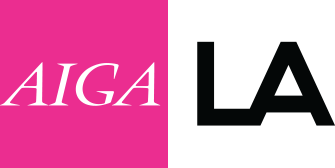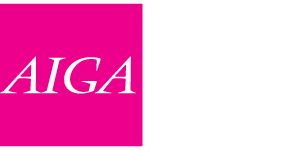In support of AIGA’s Women’s Leadership initiative, AIGA LA is embarking on a series of events, interviews, and discussions to celebrate the achievements of women in design, cultivate awareness of gender-related issues, and creating connections by facilitating relationships within and beyond the design industry.
This interview occurred in Fall, 2015, as AIGA LA prepared for it’s first Women in Leadership panel discussion.
 Lawrence Azerrad, LADdesign Lawrence Azerrad founded the independent graphic design studio LADdesign in 2001. Creating graphic design and comprehensive visual identity systems for clients such as The Clinton Foundation, The Beach Boys, UCLA Institute of the Environment and Sustainability, Heal The Bay, and over a sixteen-year client relationship, spanning seven album packages for award-winning American alternative rock band, Wilco. He is the author of a personal project, a design history of the supersonic luxury airliner, Concorde.
Do you work from an office, from home, or other?
Home.
Describe your family situation.
Married, no kids, one dog.
How does this status impact you in your career?
It is very positive. In addition to feedback I highly respect and appreciate, my wife also works in the music industry, has a very broad and respected reputation, and frequently clients feel comfortable working with LADdesign as a result of my being Julie Muncy’s husband.
From your perspective as a man or woman, are your career goals or current opportunities at all impacted by your gender and or family situation?
I feel my career goals are impacted positively as a married person. Being married to someone so wonderful and that I respect makes me a more whole individual, a more balanced professional, and makes me more dynamic as a person and as a creative.
Have you or anyone you know, ever experienced a disparity or career setback that you felt was based on gender or decisions centered on family situations?
As a white male, I have not encountered specific setbacks to this family situation. It is frustrating, not in that I want to encounter setbacks, but because I know that people do face them. Being a white male, I am ashamed that this ethnic group is the dominating group in our field and know it is a grave shame that diversity in gender and race is not more present. As a Jewish male, I have never experienced anti-semitism in Los Angeles, as this culture is fairly assimilated in our city and our field, but being Jewish, I know, fleetingly, what it can feel like to judged for who you are—but it is something easy to hide. Many Jewish men have been successful in our field, and by no way does it come close to being as challenging as being a woman, person of color, or gay.
What do you think are the most damaging cultural norms about women or issues that affect women in the creative industry?
The broad sexualization of the gender in the professional sphere, but also prejudice against tenacity…that if a woman is tough, that she is difficult. Some of the most successful women in the field have this reputation. However it is known that Paul Rand was difficult and tenacious, as was Lou Dorfsman, but in these cases it was viewed as being strong and iconoclastic. In Fashion, Tom Ford is viewed as being a detail conscious impresario, Anna Wintour as difficult.
What do you feel are the biggest challenges to women’s careers when it comes to the creative industry?
At the grass roots level I do believe it is changing. I hire a lot of young graduates from the program at Otis. Most of the brightest stars are female.
In your community, who stands out to you as a leader and advocate on the topics of equality and diversity? Why?
Jessica Hische, as being excellent by doing; Karin Fong, just by being excellent regardless of gender; Sue Matthews Hale, by making it a national initiative for the AIGA.
How has your career or perspective as a professional working in a creative industry been impacted by working with women?
My mentor at Warner Bros. Records was Melanie Nissen. Gender never came between us. As a child growing up in Los Angeles in 1984, Deborah Sussman‘s graphic identity for the LA Olympics introduced me to the world of design (I was 11 years old) and probably had a role in leading me into the field.
Who are you most excited to hear speak?
I think Louise is a brilliant, affable, accessible, inspiring creative—but I’m excited to hear Jessica. She has built a legacy through a consistent practice of excellent.
I am so proud of our chapter for producing this event, I have huge respect to the committee for bringing this to our community.
|
By
Published September 15, 2015
|







